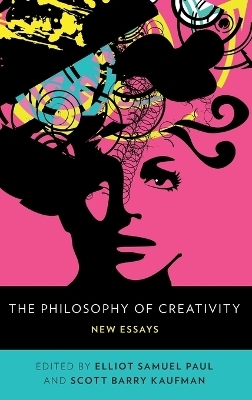
The Philosophy of Creativity
Oxford University Press Inc (Verlag)
978-0-19-983696-3 (ISBN)
Creativity pervades human life. It is the mark of individuality, the vehicle of self-expression, and the engine of progress in every human endeavor. It also raises a wealth of neglected and yet evocative philosophical questions: What is the role of consciousness in the creative process? How does the audience for a work for art influence its creation? How can creativity emerge through childhood pretending? Do great works of literature give us insight into human nature? Can a computer program really be creative? How do we define creativity in the first place? Is it a virtue? What is the difference between creativity in science and art? Can creativity be taught?
The new essays that comprise The Philosophy of Creativity take up these and other key questions and, in doing so, illustrate the value of interdisciplinary exchange. Written by leading philosophers and psychologists involved in studying creativity, the essays integrate philosophical insights with empirical research.
Elliot Samuel Paul is a philosopher who specializes in the history of early modern philosophy, theories of knowledge, and philosophical issues surrounding creativity. He holds a bachelor's degree from the University of Toronto and a doctorate from Yale University. He worked for two years as Assistant Professor/Bersoff Fellow at New York University and is now Assistant Professor of Philosophy at Barnard College, Columbia University. He is also co-founder of The Creativity Post, a non-profit web platform that features quality content on creativity, innovation and imagination. Scott Barry Kaufman is one of the world's foremost experts on the development of intelligence and creativity. He applies a variety of perspectives to come to a richer understanding and appreciation of all kinds of minds and ways of achieving greatness. He holds a doctorate from Yale University and a Masters degree from Cambridge University, where he was a Gates Cambridge Scholar. In addition to co-editing the well-regarded Cambridge Handbook of Intelligence (Cambridge University Press, 2011), Dr. Kaufman is author of Ungifted: Intelligence Redefined (Basic Books, 2013). He is also co-founder of The Creativity Post.
I. Introduction ; Elliot Samuel Paul & Scott Barry Kaufman ; Introducing The Philosophy of Creativity ; II. The Concept of Creativity ; 1) Bence Nanay ; An Experiential Account of Creativity ; III. Aesthetics & Philosophy of Art ; 2) Gregory Currie ; Creativity and Insight ; 3) Noel Carroll ; The Creative Audience: Some Ways in which Readers, Viewers and/or Listeners Use their Imaginations to Engage Fictional Artworks ; 4) Christopher Peacocke ; The Products of Musical Creativity ; IV. Ethics & Value Theory ; 5) Owen Flanagan ; Performing Oneself ; 6) Matthew Kieran ; Creativity as a Virtue of Character ; V. Philosophy of Mind & Cognitive Science ; 7) Simon Blackburn ; Creativity and Not So Dumb Luck ; 8) Dustin Stokes ; The Role of Imagination in Creativity ; 9) Roy F. Baumeister, Brandon J. Schmeichel, & C. Nathan DeWall ; Creativity, Consciousness, and Free Will: Evidence from Psychology Experiments ; 10) Elizabeth Picciuto & Peter Carruthers ; The Origins of Creativity ; 11) Margaret Boden ; Creativity and Artificial Intelligence: a Contradiction in Terms? ; VI. Philosophy of Science ; 12) Dean Keith Simonton ; Hierarchies of Creative Domains: Disciplinary Constraints on Blind-Variation and Selective-Retention ; VII. Philosophy of Education (& Education of Philosophy) ; 13) Berys Gaut ; Educating for Creativity ; 14) Alan Hajek ; Philosophical Heuristics
| Verlagsort | New York |
|---|---|
| Sprache | englisch |
| Maße | 236 x 165 mm |
| Gewicht | 607 g |
| Themenwelt | Geisteswissenschaften ► Psychologie ► Allgemeine Psychologie |
| Geisteswissenschaften ► Psychologie ► Sozialpsychologie | |
| ISBN-10 | 0-19-983696-5 / 0199836965 |
| ISBN-13 | 978-0-19-983696-3 / 9780199836963 |
| Zustand | Neuware |
| Informationen gemäß Produktsicherheitsverordnung (GPSR) | |
| Haben Sie eine Frage zum Produkt? |
aus dem Bereich


